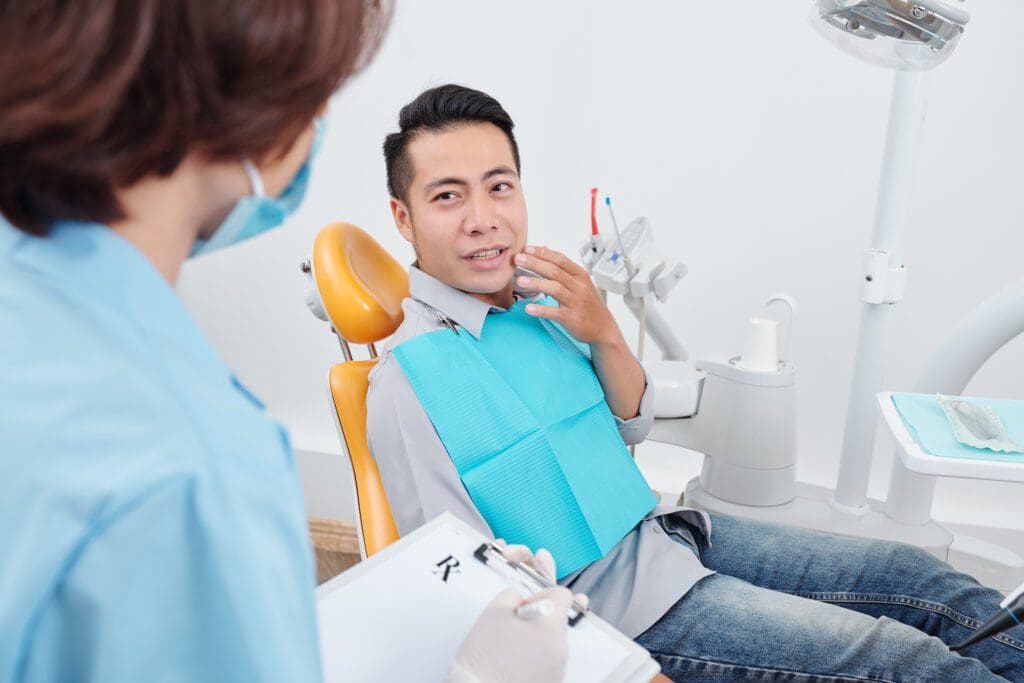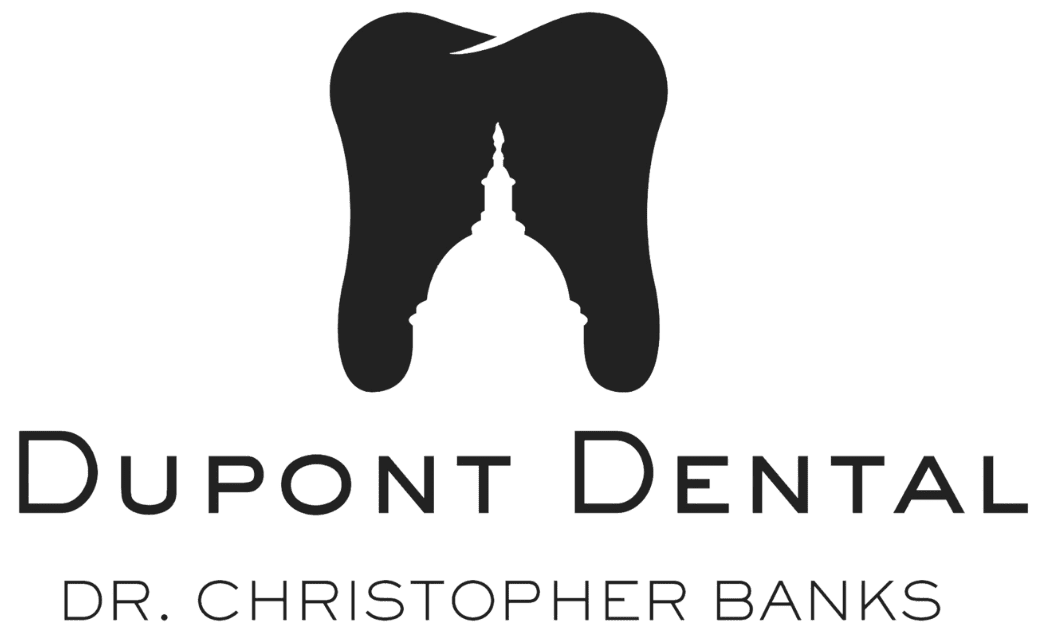At Dupont Dental, we provide comprehensive general dentistry in Washington, DC to help patients maintain healthy smiles through every stage of life. Dr. Christopher Banks provides the preventive dental care you need to keep a healthy mouth and happy smile. Our general dental treatments prevent gum disease, tooth decay, and dental emergencies for patients in Dupont Circle, Downtown DC, and Northwest DC.
Regular dental visits allow our team to examine your mouth thoroughly. After an exam, our dental hygienist can provide a dental cleaning and oral health review. If Dr. Banks finds issues, he will only recommend the most relevant treatments and procedures. Visit our Northwest Washington dental office to prevent future dental problems.

General Dentistry Services in Washington, DC
Routine, preventative, or general dental care keeps your teeth and gums healthy. Our general dental treatments can help you maintain your health or address common concerns. Dr. Banks and his team can help you find the right treatment to meet your needs at Dupont Dental.
As a member of the American Dental Association and the Maryland Dental Association, Dr. Banks is here to provide the best care for his patients with the latest techniques.
Dental Cleanings and Exams
Routine dental cleanings at least twice a year are important for your dental health. A dental cleaning will keep your mouth fresh and free of harmful bacteria. You can try to remove plaque and tartar at home, but nothing beats professional teeth cleaning.
Dr. Christopher Banks is a general dentist who also provides dental exams and second opinions. Our dental exams include reviewing your masticatory system and a screening for oral cancer.
Custom Mouthguard
If you play sports, you need to wear a sports mouthguard. Contact sports pose a great risk to your teeth, soft gums, and mouth. Every blow to the face can cause damage, like cracks and chips in your tooth enamel. However, a custom mouthguard can avoid all potential issues.
Our custom mouthguards prevent dental injuries or damage to braces and other orthodontic appliances during contact sports. We custom-mold them from the shape of your mouth so they fit as comfortably as possible.
Emergency Dentistry
For dental emergencies, call our office immediately at (202) 946-4720. We do everything possible to see you on the same day you call. Common dental emergencies we address in our office include tooth decay, lost teeth, and broken dental restorations. Getting emergency care can prevent the need for more complex dental treatment.
Laser Dentistry
We use soft-tissue diode dental lasers to cut and contour excess gum tissue. Lasers are modern dental tools that use light and heat to target tissue with minimal bleeding. Best of all, laser dentistry procedures are painless! Contact us if you have a gummy smile, gum disease, bleeding gums, or gum pain.
Tooth Extraction
During tooth extraction, we remove severely decayed teeth, overcrowded teeth, and impacted wisdom teeth. We ensure that patients are comfortable throughout the extraction process. Dental extractions also help relieve pain from dental problems like infection or overcrowding. But we only recommend a tooth extraction if necessary.
Root Canal and Dental Fillings
These routine procedures address tooth decay. A root canal procedure removes a dental infection from a badly damaged tooth. During treatment, we remove the diseased pulp, cells, blood vessels, and tissue.
Then, Dr. Banks cleans the inside of the tooth and places a dental filling to seal it. He may also place a dental crown to protect the tooth from decay or if he had to remove a lot of enamel.
Instead of traditional silver fillings, we treat cavities with composite resin or white fillings. Composite resin fillings blend in with the color of your natural teeth and strengthen teeth. Root canal procedures and dental fillings prevent tooth loss and preserve the tooth’s structure.
Frequently Asked Questions
Do you want to learn more? We can help. Read answers to common questions about general dentistry in our Washington, DC, dental office.
Do dental lasers hurt?
You’ll feel little to no pain during dental laser treatment, so we often don’t need to use a local anesthetic. While you may feel sensation, the lasers aren’t painful.
How do I know if I have a dental emergency?
You likely have a dental emergency if you have sudden or severe symptoms that won’t go away. Some emergencies are obvious, like a knocked-out tooth, bleeding gums, or tooth pain.
Call our office if a problem is not manageable at home or if you can’t wait until a scheduled appointment. We also recommend that patients contact a hospital if they have sustained physical injuries and require medical care.
Are sports mouthguards required for children?
Yes, we recommend sports mouthguards for all athletes, regardless of age. A custom-made professional mouthguard protects teeth, gums, and orthodontic appliances like braces. You need to wear a mouthguard for any sports with contact between players, like hockey, lacrosse, or soccer.
How can I prevent cavities?
A good oral hygiene routine is one of the best ways to prevent tooth cavities. At home, brush for two minutes at least twice a day with a soft-bristled toothbrush and fluoride toothpaste. Floss between each tooth before you brush.
You can also reduce sugary foods and drinks in your diet and drink more water. Water helps in saliva production to wash away harmful bacteria that cause cavities.
Do I need a filling or a root canal?
The right treatment for you depends on the extent of your tooth damage. We recommend a dental filling if you have a small or medium cavity. If you have a hole in your enamel, we can clean it out and fill it to restore the tooth.
You will need a root canal if the decay or infection has reached the inside of the tooth. If bacteria get into the nerves and blood vessels, it can cause pain, swelling, and even an abscess.
What’s the difference between a dental hygienist and a dentist?
Yes, our dental hygienists focus on keeping your teeth and gums clean and healthy. They perform dental cleanings that remove plaque and tartar from the teeth and gums.
A dentist is trained to diagnose and treat more complex dental problems. Dentists can fill cavities, fix broken teeth, and do other procedures like root canals and extractions. Our dentists also check for signs of issues like gum disease or oral cancer.
How much do dental cleanings cost?
The cost of a dental cleaning can vary based on whether or not you have dental insurance. You may pay less if you have dental insurance because it covers part or all of the cleaning cost. At Dupont Dental, we accept out-of-network benefits from the top insurance companies like Blue Cross Blue Shield, Cigna, and more.
What do I do if I have a toothache?
If you have a toothache, first find the source of your pain. You can use floss to dislodge any objects, like stuck food, that may cause pain. If you experience swelling, use a warm salt water rinse. You can also take pain medication.
Call our office if you have sudden or severe tooth pain. You may have a tooth injury or dental abscess that needs immediate treatment.
Patient Review
Contact Our Dental Office
Has it been a while since your last dental visit? Call Dupont Dental today for general dentistry treatment in Washington, DC, at (202) 946-4720. You may also request a dental appointment with Dr. Banks online. Visiting the dentist regularly can keep your smile healthy and prevent future dental problems and complications.
